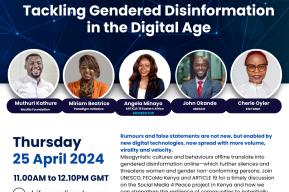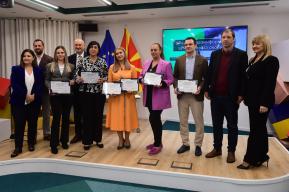News
Broadcasters in The Gambia celebrate World Radio Day 2024

Radio is an essential means of information and communication in The Gambia. It is part of the major media resources in the country which makes it a powerful and influential tool for information, education and entertainment. World Radio Day is commemorated every year on February 13th to celebrate this powerful medium that is used across the globe. In line with this year’s theme of “A century informing, entertaining and educating”, The Gambia’s National Commission for UNESCO (NATCOM) with support from the UNESCO Regional Office in Dakar, organised an illuminating World Radio Day celebration in The Gambia. The event featured radio stations from across the country who lamented on the history of radio and its powerful impact while highlighting the value of radio within our community in addressing hate speech, mis/disinformation.
During the program opening, Mr. Baboucarr Cham, Chair of the Media Council of The Gambia welcomed guest and thanked them for taking the time to attend the celebration. He expressed gratitude to UNESCO Dakar and the National Commission for UNESCO for their continuous support for radio journalists especially when it comes to providing trainings on ethics, preventing hate speech and promoting democratic principles. This, he added, is the true path to attaining SDG 16 on peace, justice and security.
NATCOM’s Maimuna Sidibe congratulated radio stations and journalists for keeping our society informed and educated on the issues affecting us. She explained that radio bridges communities and engages them in relevant discourse. She highlighted that most households in The Gambia, especially in the rural areas, utilize radio as it is the most accessible and popular form of media. It is therefore imperative to celebrate and support them to ensure that our communities continue to receive relevant and accurate information. UNESCO has supported numerous efforts in The Gambia to help assess and develop media personnel, promote gender equality and provide accurate COVID-19 information. It is therefore unsurprising that the campaign to counteract hate speech, mis/disinformation is being supported by UNESCO.
The Deputy Permanent Secretary of the Ministry of Information Mr. Fanding Kinteh commended the organizers while reassuring participants of the government’s commitment to ensuring a free atmosphere for journalists to practice. He further highlighted that they are working with partners to ensure that the media laws in The Gambia are just and do not serve as weapons to be used against journalists for doing their work.
Over the course of the day, numerous veteran journalists took turns to share their knowledge on the importance of journalism ethics, the role of effective radio programming as well as a comprehensive review of the Charter of Ethics for Journalism. Some of the key talking points raised during the session were that:
Journalists must always strive to tell the truth as honesty forms the crux of the practice. It was highlighted that neither speed nor format excuses inaccuracy and when in doubt, a journalist must leave out information that cannot be verified to avoid misinformation.
Journalists must be transparent in the way they work and honour the agreements they have with sources and guests on air.
They should also be accountable for the information they share and rectify themselves when it is proven that the information they have given is inaccurate.
Journalists should not plagiarize from other media outlets especially reading directly onto a radio broadcast as this is unethical and can implicate broadcasters in the spread of false information. It is always good for broadcasters to follow copyright rules and credit their sources.
Broadcasters also fall within the Cherno Jallow Charter of Ethics and should abide by the rules it provides for them
Participants also threw light on the fact that despite it being a short event, they have learned about the importance of fact-checking in the work of radio broadcasters and that following the charter of ethics is essential in combating hate speech and mis/disinformation. They encouraged UNESCO to organize more events and trainings, especially for community radio personnel so as to build their capacity on strengthening peace.










